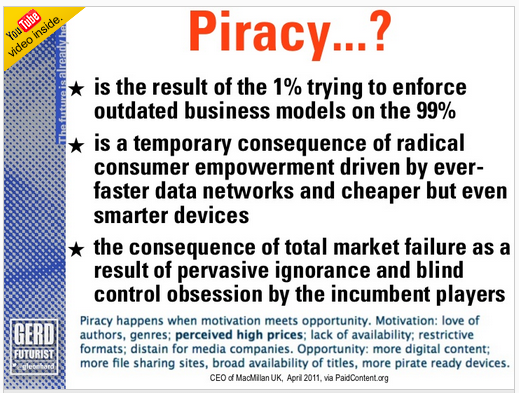 I’ve been following the work of Gerd Leonhard for a few years. His presentation at MIDEM 2012 was particularly eye-opening, especially where he talks about the impact of mobile devices on music. If you’ve not been following him, here’s an opportunity to get up to speed. When major record labels are lobbying Government for new laws on your internet use, it’s time to pay attention.
I’ve been following the work of Gerd Leonhard for a few years. His presentation at MIDEM 2012 was particularly eye-opening, especially where he talks about the impact of mobile devices on music. If you’ve not been following him, here’s an opportunity to get up to speed. When major record labels are lobbying Government for new laws on your internet use, it’s time to pay attention.
Last year Wired.co.uk proclaimed that Gerd Leonhard wanted to ‘reset the music business‘. They’re not far off the mark.
The idea that copyright infringement earns more for lawyers than musicians is an interesting point. Does the threat of legal action ever deter someone from downloading digital content without paying for it? Not likely.
In the Wired interview he says,
“In 2017, we’ll have five billion connected devices, 75 percent of that will be mobile, accessing 50 or so platforms of content, sharing a €250 billion ad market.”
Immediately you can see why the likes of Apple, Microsoft, Google and others want to control how you access music. The big money they’re after isn’t from selling the music itself, it’s from device sales and from the ads they can target at you with your personal data. Google wants your data so badly they subsidise their Nexus Android smartphone and tablet devices to make them cheaper to buy than rival products.
With Microsoft and Sony already fighting over your living room, access to music could easily become part of your Xbox Live subscription or PlayStation Plus subscription. Kids are much more likely to do that and bounce the music around their various devices than bother with physical copies of records.
That might make you sad, especially if you’re a vinyl enthusiast. However, that’s the reality of the future of music when so many other forms of entertainment now exist.
I enjoy buying CDs and Vinyl but part of that is simply my way of paying the artist. I listen to Spotify most days due to convenience during work hours.
Perhaps the kickstarter approach to art will give bands a more credible way of funding recording projects. If you’d tried it ten to fifteen years ago as an unsigned band, you may as well have deducted one million hipster points from yourself. Mindsets usually don’t change overnight.
I can remember Fife band RISINGSON asking fans for money to fund recording of an album and being absolutely slated for doing so. Yet if Franz Ferdinand did it today no-one would bat an eyelid. In fact, some media people would probably praise the idea as forward-thinking. Sometimes I see so much hypocrisy in the Scottish music scene that you have to laugh.
There’s a lot of material available by Gerd so let’s start with this slideshare. If you want to play ‘Dinosaurs Will Die‘ by NOFX at the same time, even better.
A few of the key ideas from the slides that prompt the need for further discussion include:
- Laws & policies paid for by lobbyists
- Criminalisation of Consumers
- The need to redefine the definition of “selling music”
And if you run an indie label, you might have an opinion on the whole piracy issue.

There’s a line here and you have to wonder where tiny and small indie labels draw it.
MIDEM – Making a living with music in a digital world
There’s a lot more to be said and written on this subject so I may update this post tomorrow if I have time. Otherwise I’ll do a follow-up post in the near future.
Now that we have to have a Record Store Day to promote the idea of buying physical copies of records, the end for physical music must be near.
FOLLOW GERD LEONHARD ON TWITTER
